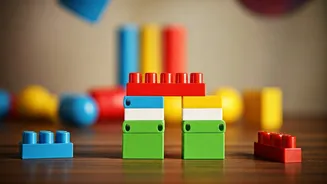Make Math Fun!
One of the most effective strategies is to make math fun and relatable. Instead of presenting math as a dry subject, integrate it into everyday activities.
For example, when cooking, involve your children in measuring ingredients and calculating proportions. When playing games, use the opportunity to count points, strategize moves, and teach them about probability. By incorporating math into enjoyable experiences, you can transform the way children perceive the subject and encourage a positive attitude towards it. This approach makes learning feel less like a chore and more like an exciting adventure, helping them realize that math is all around them and can be a source of fun and engagement.
Embrace Real-World Math
Connecting math to real-world scenarios is crucial to make the subject relevant and interesting. Take your children shopping and let them calculate discounts, estimate costs, and compare prices. When traveling, help them figure out distances, map routes, and convert currencies. These real-life applications demonstrate the practicality of math and show them how essential math skills are in their everyday lives. Discussing how math is used in different careers, from engineering to music, can also broaden their perspectives and inspire them to see the numerous possibilities that math unlocks. This connection helps to highlight the utility and relevance of math concepts.
Use Math Games
Utilize math games to enhance the learning process in a playful manner. Board games like Monopoly or card games that involve counting and strategy can improve their skills without the feeling of doing homework. Several online math games and apps are designed to make learning engaging and interactive. These games provide immediate feedback, which can assist in building confidence and encourage a growth mindset. These games help children practice and master key math concepts such as addition, subtraction, multiplication, and division in a stimulating way. By integrating games into the learning routine, math transforms from a boring subject to a fun challenge.
Hands-On Activities
Hands-on activities can greatly improve a child's grasp of math concepts, especially in the early years. Use blocks, beads, or other tangible objects to teach them about numbers, shapes, and patterns. For example, when introducing multiplication, create arrays with small objects to visually demonstrate how multiplication works. Encourage them to measure, build, and create using various materials. These practical experiences reinforce concepts and make abstract ideas more concrete and easier to understand. This tactile approach helps in activating different areas of the brain, leading to better retention and comprehension. Hands-on activities also enhance creativity and problem-solving abilities.
Praise Their Effort
Praising the effort rather than focusing solely on the outcome is essential for encouraging a growth mindset in children. When your children tackle math problems, recognize and appreciate their efforts and strategies, even if they don't get the correct answers immediately. This helps them to see that making mistakes is a natural part of learning, encouraging perseverance and resilience. Discussing their approaches, providing constructive feedback, and celebrating their progress will motivate them to keep trying and develop a positive attitude towards challenges. This supportive environment helps children to view math as a skill they can improve through dedication and practice, rather than something they are inherently good or bad at.
Create a Routine
Establishing a consistent math learning routine will reinforce concepts and help your children develop a regular practice habit. Set aside a specific time each day for math practice, whether it’s a short session after school or on weekends. Consistency is key, as it helps your children build a strong foundation of knowledge and skills over time. Keep the sessions engaging and varied to maintain their interest. Combine these practices with games, real-world examples, and hands-on activities. A structured routine provides a predictable framework that makes learning math a natural part of their day. This regular practice not only strengthens their math skills but also instills discipline and organization.
Seek Extra Support
If your child is struggling with math, seeking additional support is a sensible step. This could involve tutoring, extra assistance from teachers, or online resources. Tutors can provide individualized attention and cater to your child's specific learning needs, helping them overcome challenges and build confidence. There are numerous online platforms that offer interactive lessons, practice exercises, and tutorials designed to support different learning styles. Work with your child's teacher to gain insights into areas where they are facing difficulties and to align your efforts with the classroom curriculum. By providing additional support, you can ensure that your child receives the help they need to succeed and enjoy math.












